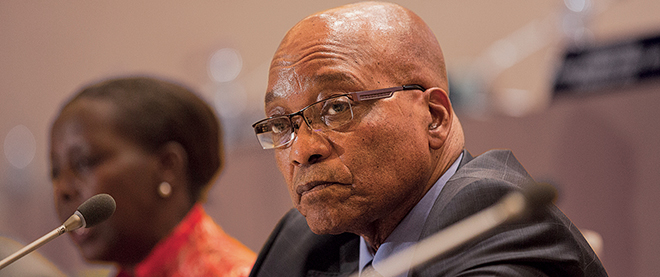Arms Procurement Commission begins amid fraud allegations
It’s a rocky start for Jacob Zuma’s government
Jiro Ose/Redux
Share

A rocky start is one way of putting it. In 2011, the Arms Procurement Commission, a South African judicial inquiry, was tasked with uncovering the truth about an allegedly fraudulent US$7-billion arms deal made in 1999, involving many of the ruling ANC party’s top brass, including President Jacob Zuma. Instead, before the first witness could even take the stand, high-profile resignations and accusations from former senior investigators have mired the proceedings, and left many wondering whether the real agenda is to let those politicians implicated in the deal off the hook.
The most recent resignation came two weeks ago, when Judge Francis Legodi, one of the commission’s three judges, quit his post. According to reports, he was unhappy with the secret workings of the commission. “This is a troubled commission,” says Francis Antonie, director of the Helen Suzman Foundation, a think tank promoting democracy. “Withdrawals have left people wondering if it is able to fulfill its mandate.”
The arms deal under scrutiny involved contracts with international companies to purchase fighter jets, submarines, corvettes, helicopters and tanks. But it’s long been alleged many key players received kickbacks, including Zuma and his former financial adviser Schabir Shaik, who was convicted on charges of corruption and fraud in connection with the deal. With general elections coming next year, Andrew Feinstein, author of The Shadow World, a book on the global arms trade, believes Zuma’s reputation will take a hit. “It will add to the sense of a corrupt politician who has done little good in office,” he says, “and spent his time enriching his family and political allies.”
While government-appointed commissions investigating major crimes in South Africa are typically met with great fanfare at their launch, critics say they often devolve quickly into blundering toothless bodies, used by the state to protect itself and deflect blame. Last Tuesday, the arms commission, now down to just two judges, finally got under way in Pretoria, the nation’s administrative capital, after a five-month delay. Terry Crawford-Browne, a longtime anti-arms -deal campaigner, made a wide-ranging application that questioned the top-secret classification of some documents gathered by the commission and the necessity of secretive in-camera sessions. But his application was dismissed and the proceedings continued, kicking off with the first witness, a burly retired admiral, Alan Green. “There was a dire need for us to rejuvenate our equipment,” said Green. For the rest of the week, navy personnel would defend the arms purchases. One of the most anticipated witnesses, former president Thabo Mbeki, won’t testify for another few months.
Feinstein isn’t optimistic about the outcome of the commission. “I fear it will be yet another in a series of whitewashes of the deal,” he says, “and further deepen the sense of a ruling party that is more interested in its own enrichment than the needs of its people.”